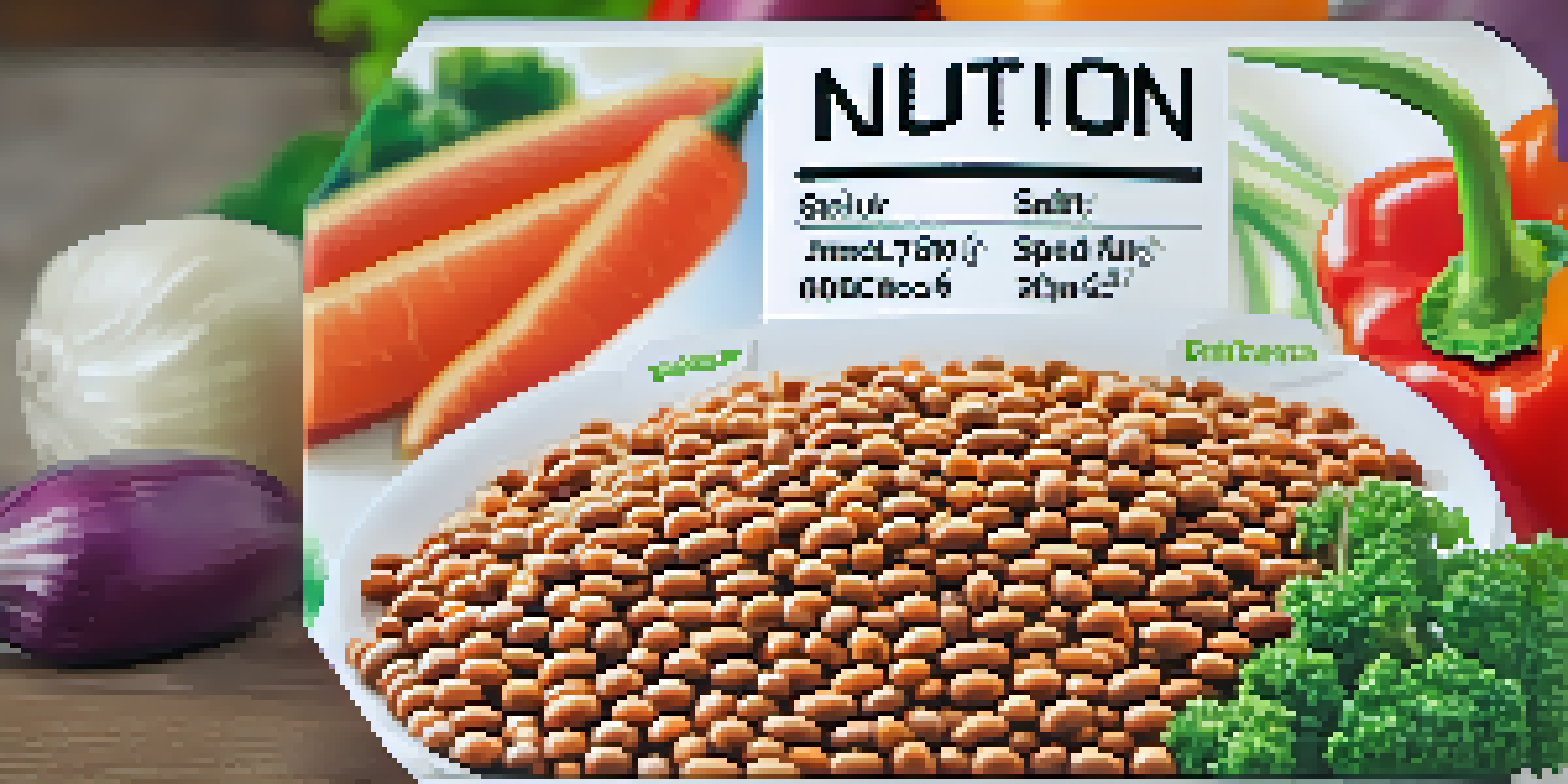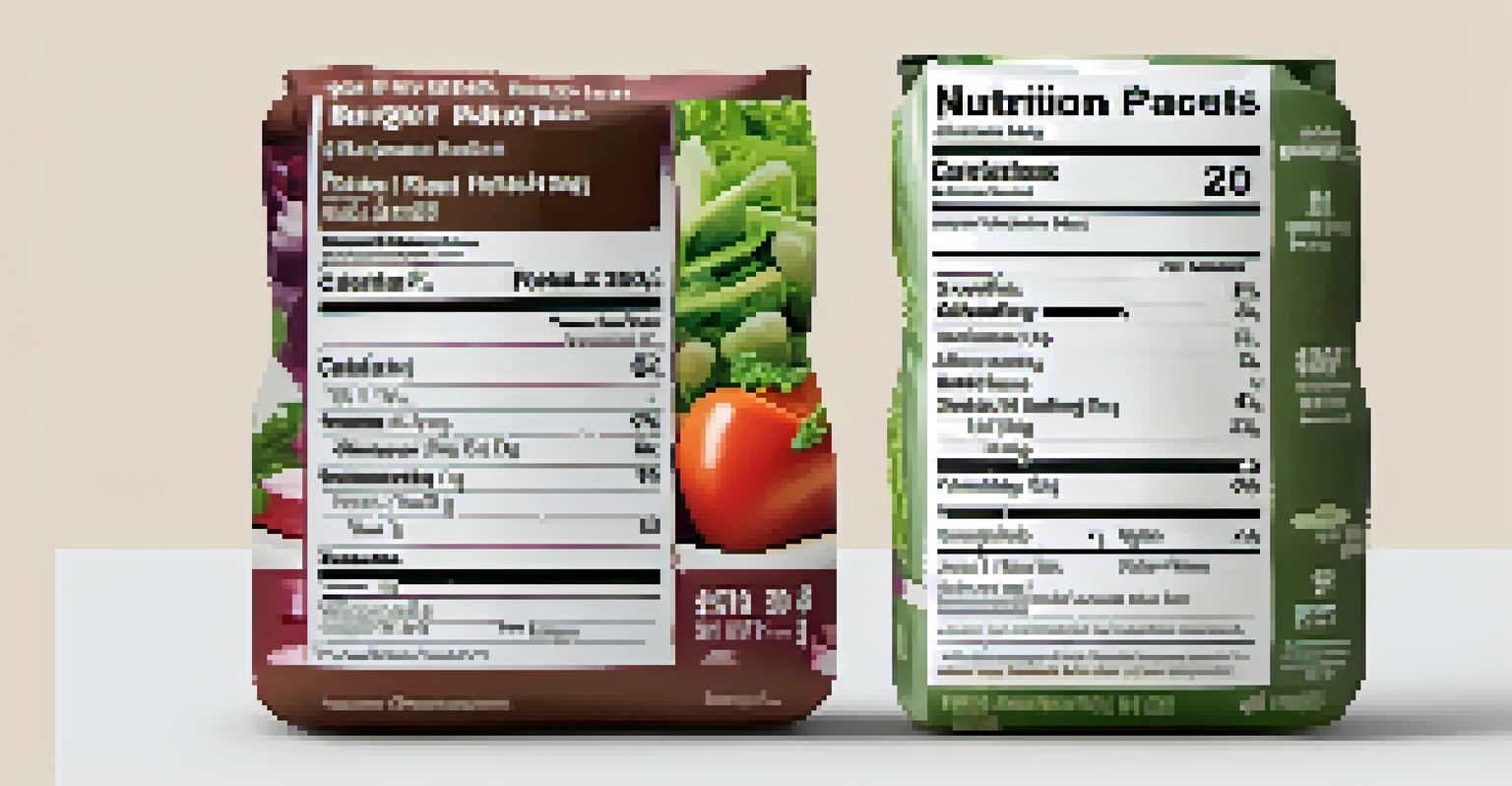Understanding Nutrition Labels for Vegetarian Foods Basics

Why Nutrition Labels Matter for Vegetarians
Nutrition labels are essential tools for anyone, but they hold particular significance for vegetarians. These labels help you understand what you’re consuming, ensuring you meet your dietary needs without missing out on essential nutrients. With an increase in plant-based eating, knowing how to read these labels can guide your food choices effectively.
You are what you eat, so don't be fast, cheap, easy, or fake.
For instance, if you're lacking protein in your vegetarian diet, a quick glance at the label can help you select foods like lentils or chickpeas that are high in this vital nutrient. Additionally, understanding labels can help you avoid hidden ingredients that may not align with your dietary preferences or ethical values.
In essence, being informed about nutrition labels is empowering. It allows you to take charge of your health by making informed decisions, ensuring your vegetarian lifestyle is as balanced and nourishing as possible.
Deciphering the Nutrition Facts Panel
The Nutrition Facts panel is the heart of any food label, providing a wealth of information at a glance. It includes key elements like serving size, calories, and nutrient breakdown, which are crucial for managing your diet. Understanding these components can prevent you from consuming more than you intend, especially with calorie-dense vegetarian snacks.

Take serving size, for example: it can often be misleading. If a bag of nuts lists a serving size as just 28 grams, you might be surprised to find that you’re eating several servings in one sitting. Knowing how to interpret these figures can help you maintain portion control and stick to your dietary goals.
Nutrition Labels Empower Choices
Understanding nutrition labels helps vegetarians make informed food choices that align with their dietary needs.
Moreover, the panel highlights important nutrients, such as fiber and vitamins, which are crucial for vegetarians. By focusing on products that are rich in these nutrients, you can make healthier choices that align with your dietary needs.
Understanding Ingredients Lists on Labels
The ingredients list on a nutrition label tells you what’s actually in the food. For vegetarians, this is vital, as some products may contain animal-derived ingredients that aren’t immediately obvious. Familiarizing yourself with common hidden ingredients, like gelatin or rennet, can help you avoid unsuitable products.
Nutrition is not just about eating, it's about learning to live.
Additionally, ingredients are listed in descending order by weight, meaning the first few ingredients make up the bulk of the product. This can give you insights into the quality of the food. For example, if whole grains are among the first listed, you can feel confident that you’re choosing a healthier option over one laden with fillers.
Being vigilant about ingredient lists not only helps you maintain your vegetarian lifestyle but also encourages you to opt for whole, minimally processed foods. This can significantly enhance your overall health and well-being.
Identifying Healthy Fats and Oils
Fats are often misunderstood, but they play a crucial role in a balanced diet, including vegetarian options. Healthy fats, such as those from avocados, nuts, and olive oil, are beneficial for heart health and overall nutrition. Nutrition labels can help you differentiate between healthy and unhealthy fats by showing the types of fat listed, such as saturated and trans fats.
To maintain a healthy vegetarian diet, aim for products with unsaturated fats while limiting saturated and trans fats. This is especially important when choosing processed vegetarian snacks or prepared meals, which may have higher levels of unhealthy fats.
Focus on Fiber and Protein
Prioritizing high-fiber and protein-rich foods is crucial for maintaining a balanced vegetarian diet.
Incorporating healthy fats into your diet can enhance the absorption of fat-soluble vitamins A, D, E, and K. So, don’t shy away from healthy fats; instead, use nutrition labels to guide your choices and enjoy the benefits they bring.
The Importance of Fiber for Vegetarians
Fiber is a superstar nutrient for vegetarians, playing a vital role in digestive health and helping to maintain a feeling of fullness. When checking nutrition labels, look for products high in dietary fiber, which is often derived from whole grains, fruits, and vegetables. This is crucial for a balanced vegetarian diet, as fiber can help prevent digestive issues.
For instance, a breakfast cereal that boasts a high fiber content can be a great way to start your day, keeping you satisfied longer and stabilizing blood sugar levels. By making fiber a priority, you can better manage hunger and promote gut health.
Moreover, many fiber-rich foods are also packed with other essential nutrients, making them doubly beneficial. By focusing on fiber content, you’re not just filling up; you’re fueling your body with nutrients that support overall health.
Evaluating Protein Sources in Vegetarian Foods
Protein is a primary concern for many vegetarians, and nutrition labels can help you identify sources that meet your needs. Unlike animal products, plant-based proteins can vary in quality and completeness. Therefore, understanding how much protein is in your food can guide you in creating a balanced diet.
Look for labels that highlight high-protein foods such as quinoa, lentils, and legumes. These foods not only provide protein but also come with additional nutrients that support a healthy vegetarian lifestyle. For instance, pairing rice and beans together can create a complete protein, offering all essential amino acids.
Watch Out for Added Sugars
Being aware of added sugars in vegetarian products can prevent energy crashes and support overall health.
Incorporating a variety of protein sources into your meals is essential. By reading labels and choosing diverse protein-rich foods, you can ensure you're getting the nutrients necessary to maintain energy levels and overall health.
Checking for Added Sugars in Foods
When it comes to maintaining a healthy diet, being aware of added sugars is key, especially in vegetarian foods that may seem healthy at first glance. Many processed vegetarian snacks and drinks can be loaded with sugars that can lead to energy crashes and unhealthy eating habits. Nutrition labels will indicate the amount of added sugars, helping you make smarter choices.
For instance, a seemingly healthy fruit smoothie might contain more added sugars than you expect, undermining your health goals. By scrutinizing the labels, you can opt for products that utilize natural sweetness from fruits instead of processed sugars.

Reducing added sugars not only supports weight management but also enhances overall well-being. By prioritizing low-sugar options, you can enjoy a vegetarian lifestyle that nourishes your body without excess calories.
Practical Tips for Reading Nutrition Labels
Reading nutrition labels doesn’t have to be overwhelming; with a few practical tips, you can make it a breeze. Start by familiarizing yourself with the key sections of the label, such as serving size, calories, and nutrients. This foundational knowledge can help you quickly assess whether a product aligns with your dietary needs.
Another useful tip is to compare similar products side by side. This not only helps you choose the healthier option but also reinforces your understanding of nutritional values. For example, comparing two types of plant-based burgers can reveal which one is higher in protein and lower in sodium.
Lastly, don’t hesitate to take your time while shopping. With practice, reading nutrition labels will become second nature, allowing you to make informed choices that support your vegetarian lifestyle and overall health.